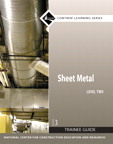A group of sheet metal workers will split almost $1.7 million as part of a racial discrimination lawsuit settlement reached with a New Jersey union and the U.S. Equal Employment Opportunity Commission.
The commission’s decades-old lawsuit alleged that Sheet Metal Workers Local 25 and its apprentice school favored white workers in hiring and HVAC construction assignments over African American and Hispanic union members from April 1991 through 2002.
"EEOC is committed to ensuring equal opportunities throughout the construction trade," said EEOC New York district office district director Kevin Berry. "Through remedial agreements like the one in this case, we can rid this industry of such invidious race discrimination."
The $1.65 million settlement will be split by 39 people. Under the settlement, the union does not admit any wrongdoing. Local 25 officials point out that the lawsuit was originally filed long before Local 25 was established by splitting off from New York-based Local 28.
"We are glad that this matter has finally been resolved," said Joseph Demark Jr., Local 25's president/business manager and co-chairman of its joint apprenticeship training committee. "Our local has worked to eliminate the vestiges of any discrimination that may have existed in the past, and I believe we have been successful in that effort. This settlement will further good relations and fair dealing among all of our members and employers as we continue forward together."
Raechel Adams, the EEOC's New York acting regional attorney, said the commission will continue to make this issue a priority.
"EEOC will continue to bring strong enforcement actions until black and Hispanic sheet metal workers no longer face discrimination on the jobsite,” she said. “Today's settlement is an important step in realizing justice for these workers."
Richard Haenssler, president of Haenssler Sheet Metal Works in Newark, New Jersey, and co-chairman of the union’s training committee, said Local 28 is committed to a diverse workforce.
"Our JATC consistently has a higher percentage of minority apprentices graduating into journey person status than any other skilled building trade in New Jersey," he said. "Our industry is proud of that record. We believe that our industry has been free from systemic discrimination for many years and can now serve as a model for the other building trades to follow. We now have a diverse workforce that truly reflects the makeup of the communities we live and work in.”







